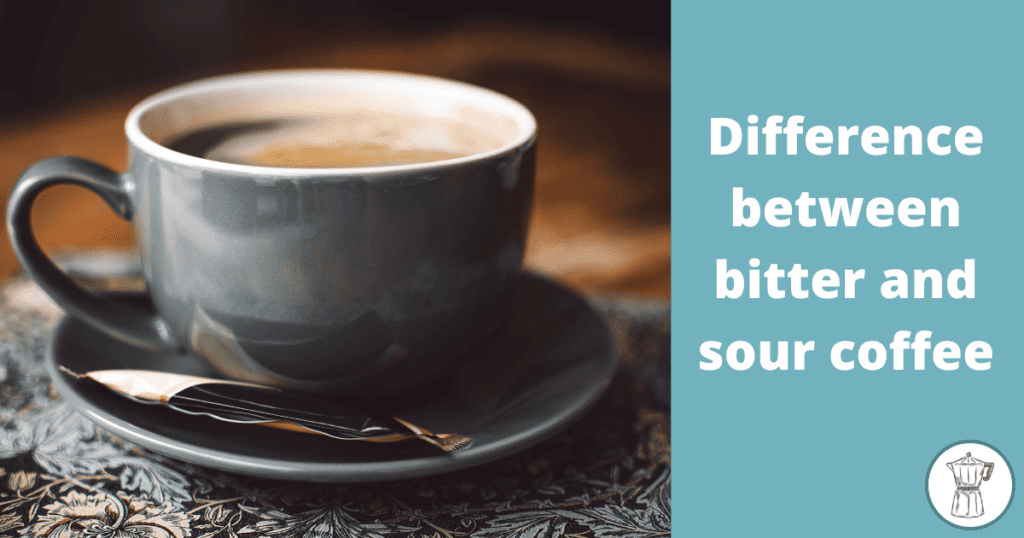This is something that I was thinking about the other day and I was talking to my girlfriends over a cup of coffee.
They both taste terrible, and you can tell there’s something wrong with your coffee, but what’s the difference between the 2? We went online and read multiple articles on the topic and I’d like to share what we found out with you. I also share tips on how to make bitter coffee sweeter quickly and easily.
Let’s dive in.
What’s the difference between bitter and sour coffee?
We associate the bitter taste in coffee with intense and rather unpleasant coffee which is almost undrinkable, whereas sour coffee is normally associated with acidic coffee; the level of acidity is heavily dependent on the coffee beans you use for brewing.
Bitter coffee
Let’s go over the factors that cause bitter coffee and how you can make it sweeter.
What causes bitter coffee
There can be many factors that make your coffee bitter. But it’s wise to chat about the most common ones to help you avoid brewing undrinkable coffee.
Here are the main reasons:
- Grinding size: depending on your machine or the gadget you use for brewing, it’s wise to adjust the grinding size. For example, if you brew with a French press you need coarser coffee grinds compared to the grinding size for brewing with a Moka pot. Another common issue with the wrong coffee grinds is over extraction. If you use a coffee machine for brewing and the grinds are thinner than what the manufacturer recommends you’ll over extract coffee flavours and aromas which lead to bitter coffee.
- Stale coffee beans/grinds: once you open the pack of coffee beans or grinds they start getting stale and after 2-3 weeks they’re completely stale. It won’t be a surprise if your coffee will taste bitter. Throw away old coffee you’ve been keeping in your cupboard for ages and buy fresh coffee beans/grinds.
- Your brewing machine/gadget isn’t clean enough: It’s wise to give your machine or gadget a proper wash right after brewing to remove any coffee residue which can turn your coffee bitter.
- Burned coffee: if you brew with your machine or Moka pot longer than it’s recommended, the odds are that your coffee is going to be burned and taste bitter. What’s the recommended brewing time then?
- The type of coffee roast: if you’ve gone for dark roast coffee beans, the chances are that your coffee is going to taste more bitter. This type of roast is rich in Phenylindanes which make your coffee more bitter. If you really can’t stand even the slightest hint of bitterness in your coffee, I suggest you opt for either a light or medium roast.
How to make less bitter coffee
Fortunately, there are many ways you can your coffee less bitter. In fact, there are many simple ways with simple products.
Here’s a bunch of them:
- Cow milk: 1 of the simplest ways of making your coffee less bitter is to add some cow milk to it (preferably full fat). Because it’s sweet it will take the bitterness away and make your brew taste sweeter.
- Sugar: sugar is simply one of the most effective ways to make your brew taste less bitter and at the same time sweeter. A tsp will be enough to change the taste of it. If you’re on a strict diet and worried about your calorie intake, go for brown sugar or even stevia which both contain less calories than white sugar.
- Salt: this is an uncommon yet effective method for turning bitter coffee into sweet. A pinch of salt does wonders for your brew and makes your drink taste less bitter.
- Creamer: this is another popular product that many use for their coffee as its sweet rich taste really adds an extra layer of flavour to a cup of coffee. But the downside of coffee creamer is that it contains high-processed products that aren’t good for our health. If you’re cautious about your health, it’s a good idea to skip creamer.
Sour coffee
As already mentioned, sour coffee is related to acidity; the more acidic your coffee is the more sour it’s going to taste.
But what does make your coffee acidic? Let’s discuss this interesting topic in the next section.
What causes sour coffee
Here are the main reasons that make your coffee acidic:
- Coffee beans: Arabica coffee beans are more acidic than Robusta. The major of Arabica coffee grows in Ethiopia, Brazil, Guatemala, India, and Colombia, and becomes it takes them longer to mature than Robusta ones, they are richer in flavour and more acidic.
- Roast type: many assume that dark roasts are more acidic because of their colour. The reality is dark roast coffee beans are the least acidic coffee beans. See it this way, the longer coffee beans are roasted the less acidity they contain; they obviously lose acidity during the roasting process. And as you might have already guessed, light roasts are the most acidic out of the 3 types (light, medium and dark).
- Water: if you use tap water for brewing and the water in your area is acidic then your coffee is going to be acidic and hence sour.
- Grind size: if your coffee grinds are coarse, the chances are your coffee is going to be more acidic. Coarse coffee grinds make richer and more acidic coffee.
How to make less sour coffee
Let’s chat about how to brew less sour coffee:
- Use thinner coffee grinds: go for thinner coffee grinds instead of coarse, but this also depends on the machine/gadget you use for brewing. For example, you can’t really use thin coffee grinds if you’re to brew with a French press.
- Use bottled or filtered coffee: 97% of your coffee is water, so make sure you don’t use acidic water and opt for bottled or filtered (or even alkaline) that doesn’t spoil the taste of your coffee.
- Brew a cold brew: one of the best ways to brew less acidic coffee is to make a cold brew which takes long (about 12 hours) as the coffee beans or grinds lose most of their acidity during this long process.
- Brew with dark roast coffee beans: coffee made with dark roast coffee beans tastes like smoky, and the colour is extra dark. It’s a simple yet effective way to brew less acidic coffee.
Let’s wrap it up
If you’re reading this paragraph it means you made it to the end of this article, good for you. Hope you can now tell the difference between sour and bitter coffee, it’s vital to know if you really want to brew better coffee. Stay tuned, I planning to publish more articles on coffee and share tips and tricks I find out through research and experimentation.
FAQ
Do you have a burning question on the topic? Let’s chat about a bunch of questions that frequently come up when it comes to the difference between sour and bitter coffee.
What is the difference between bitter and sour espresso?
Your espresso turns bitter when you brew with your machine longer than your should or even don’t lift off the Moka pot from the hot stove on time, so the coffee gets burned. On the other hand, sour espresso is associated with the acidity level of your coffee. For example, if you brew with light roast coffee beans your coffee is going to be more acidic than it would have been if you had brewed with dark roast
What does it mean if your coffee is sour?
The acidity level is higher than usual, and an easy way to fix is to make a cold brew which is delicious and refreshing. All you need to do is soak coffee beans for about 12 hours in cold water, strain the coffee beans and you’re good to go.
Is it OK to drink sour coffee?
It’s OK as long as you’re not facing any health issues including stomach reflux or any other health issues related to your stomach as it might deteriorate your health.
Is Greek coffee sour?
It’s not because the coffee is boiled with water which doesn’t make it dry, but it might make your mouth dry, so it’s wise to have a glass of water with it.
Is Robusta coffee sour or Arabica?
Because it takes longer for Arabica beans to grow they are more acidic than Robusta, so they are more sour in taste than Robusta. If you’re facing stomach issues it’s wise to opt for Robusta coffee beans.

- How to Remove Coffee Stains From Countertop The Easy Way - December 21, 2023
- Can You Reuse Coffee Grounds in French Press? Truth Inside - December 12, 2023
- Can Expired Coffee Creamer Make You Sick? 3 Ways to Find Out - December 9, 2023
